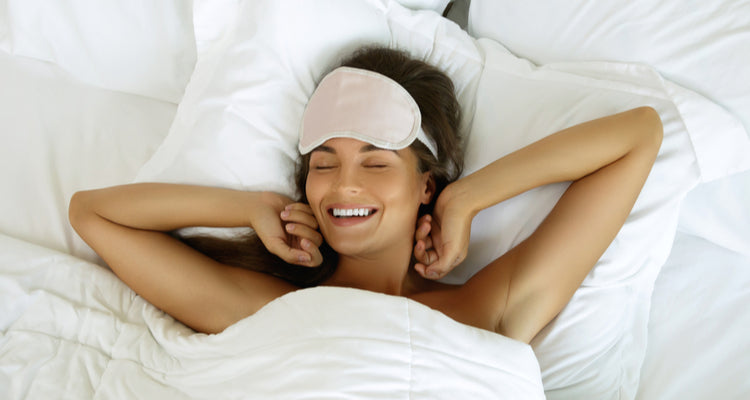One of the biggest victims of COVID-19 has been our sleep, the uncertainty around finances, jobs, health and layer in, home schooling and working from home and you have a lot of stress and nervous energy that can lead to restless night’s sleep and an overall feeling of being tense and unsettled.
Sleep is one of the pillars of good health and without adequate sleep we lose focus and productivity throughout the day, our mood is affected and it can even hamper our immune system making us more vulnerable.
Life in lockdown has meant that we have lost our normal daytime structure which in turn can upset our night-time routine. Inconsistent bed times and wake up times can shift the pressure or urge to sleep making actually falling asleep less predictable.
So, with that being said how can you ensure you are set up for the best sleep routine possible? Here are our top tips and the products that may help.
- Create a sleep schedule- Just as you would with a child, set a time for bed and a wake-up time, our bodies and minds love routine so just ensure your routine includes seven to eight hours sleep a night.
- Find time for you! Winding down for bedtime is such an important aspect of our sleep hygiene. Take the last hour before bed for an activity that relaxes and soothes you. So, limit screen time, and minimise conversation. Take a warm bath in some magnesium flakes to unwind, read a book or magazine, play your favourite relaxing playlist or try a meditation app to switch off your mind before heading to bed. Pop on a Space mask the self-heating eye mask to ease any tension behind the eyes and soothe you to a peaceful slumber.
- Create an environment to help. Ensure your bedroom is conducive to sleep. Keep the temperature cool, dark and quiet. If you need to, introduce an eye mask and enhance your space by engaging the sense of smell, try a pillow spray like the Waxperts Lavender Room spray to relax and calm before bed.
- Breathe! Try some breathing exercises to ease you off to sleep. Use ten slow deep breaths to fall asleep and return to sleep. It should be a slow inhale through your nose for 3 to 4 seconds and a slow exhale through your mouth for 3 to 4 seconds.
- Calm the restless body and mind. If you suffer from restless legs or a very active mind at night time, it may be worth considering your magnesium levels. If you are deficient in magnesium it may be difficult to switch off at night. Magnesium helps regulate the hormone melatonin which guides your sleep/wake cycle, it also aids the process of relaxation by activating the parasympathetic nervous system that helps you get calm and relaxed. Relaxing in a Magnesium bath or even a foot bath can deliver the mineral through the skin.
- Move throughout the day. Getting some gentle exercise especially outdoors is super important when it comes to being able to sleep when bed time rolls around. No matter your fitness level, try and get outside for at least 30 mins of exercise daily, a gentle walk or a run whatever you can comfortably complete.
- Take the power out of the thoughts. If worries are keeping you staring at the ceiling try and take them out of your head by writing them down. Studies have shown that journaling and in particular a gratitude journal offer a range of impressive benefits including better sleep, fewer symptoms of illness, and more happiness among adults and kids alike. Try a gratitude journal like the MoMe Gratitude Journal.

- Minimise naps- if you need to sleep during the day try not nap for more than 30 mins and before 2pm, if you have trouble actually falling asleep try a sleep aid supplement like Melissa Dream which is based on plant extracts that are used in Herbal medicine to calm your mind and body. It contains lemon balm, L-theanine, chamomile, B vitamins and magnesium in a calmative formula.
- Serotonin is the body’s ‘happy hormone’. The body uses it to send messages between nerve cells. Research shows it plays a role in mood, emotions, appetite, and digestion. It is also the precursor for melatonin which helps regulate sleep-wake cycles and the body clock. Having a healthy microbiome is essential for a healthy production of serotonin, 90% of the body’s serotonin is made in the gut. Ensure your microbiome is in balance with Symprove, the 12-week probiotic programme that helps reset the gut bacteria.
- The air quality of our surroundings has a huge impact on our sleep, if you suffer from COPD, Sleep aponia or any other respiratory conditions affecting your sleep it is worth considering introducing salt therapy into your sleep routine. The particles of salt released from the Salin Plus device as you sleep will liquify any mucus in the respiratory tract. It is recommended to plug the device in beside your bed and receive 8 hours of salt therapy as you sleep.










